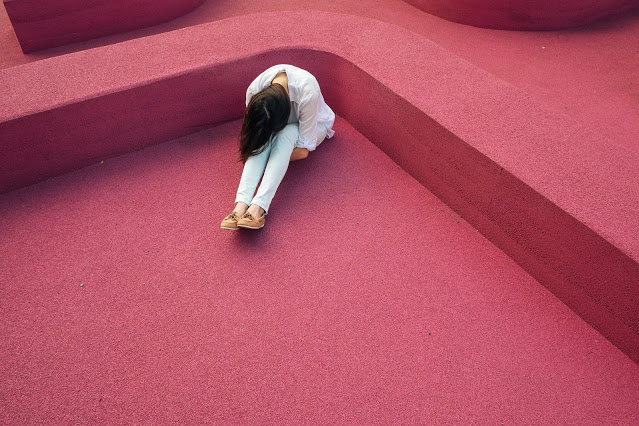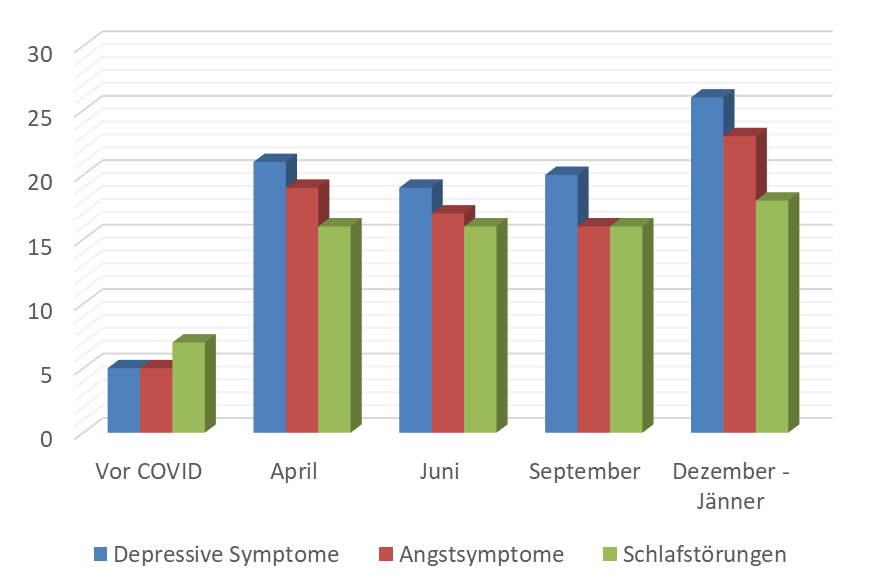Mental health continues to deteriorate, shows Austrian study: what to do?
by Various Authors, Tlaxcala, 8 February 2021. A study conducted by the Austrian University Donau-Universität Krems shows that half of all young adults suffer from depressive symptoms. Since the beginning of the COVID-19 pandemic, this university’s Department of Psychotherapy and Biopsychosocial Health has been conducting a research regarding the mental health of the population. Already in April, June and September there was an increase in depressive symptoms, anxiety or insomnia problems. Another recent study, funded by the Austrian Federal Association for Psychotherapy (ÖBVP), shows a further deterioration towards the end of the year.

In a press conference held on 27 January 2021, the author of the researchUniv.-Prof. Dr. Christoph Pieh, the director of the department of psychotherapy and biopsychosocial health and Dr. Peter Stippl, the president of the Austrian Federal Psychotherapy Association, presented the latest research results showing that about a quarter of the population (i.e. 26%) suffers from depressive symptoms, 23% of anxiety symptoms and 18% of insomnia. The research conducted at the turn of the year includes a representative sample of the population of around 1,500 people. “Another notable deterioration in mental health has been noted since the last poll in September. These results are alarming”, so the statement given by the author of the research, Christoph Pieh.
A particular burden concerns young adults
The results are particularly serious for young people of the age between 18 and 24, who have always been the most exposed age group to these problems even in the research conducted previously. In this context, there is a sudden increase from about 30 to 50%. Furthermore, it is women, the unemployed and the lonely who are particularly affected. The same aspect is reflected in a notable decrease in the quality of life that has worsened by about a fifth compared to the research conducted in 2019. An exception is represented by the age group over 65, which, as in previous research, shows a better crisis management. People who live in a relationship, have a good social environment and play sports regularly are relatively less stressed.
Different causes
Obviously the causes of the increase in mental problems are diversified and depend very much on the situation of the involved person. In addition to worries about your own health, fears about the future, financial worries, job loss or loneliness can play an important role. “In addition to the pandemic itself, the somewhat difficult economic situation, the consequences and the containment measures are experienced as particularly stressful. On the other hand, the family or social environment, overcoming stress, sports or other hobbies are perceived as useful,” Pieh explains. In addition to the duration of the pandemic, the survey period around Christmas and the beginning of the year should also have an impact.

depressive symptoms symptoms of anxiety insomnia
Image 1: Mental burden of the entire population over time (Austrian Health Survey (2019) I Pieh et al. (2020), Löwe et al. (2008) I Probst et al. (2020), Wittchen et al. (2011) I Dale et al. al. (2021))
Very severe depressive cases increased tenfold
“The development is worrying. By now, a quarter of the population suffers from depressive symptoms, even half of the young people, while in 2019 it was less than five percent”, Pieh states. The change is particularly noticeable in very severe depressive cases, which have increased tenfold compared to last year. “The measures taken so far are obviously not sufficient to keep psychological stress under control. In this context, however, a rethinking on many levels will be needed”, said ÖBVP President Dr. Peter Stippl.
Psychological burdens must be taken seriously
However, if the problems get too big, help is needed. “Professional help is usually needed, especially in severe cases,” so the author of the research, Christoph Pieh. “The significant increase in psychological disturbances illustrates the psychological effects of the pandemic and requires an immediate response adapted to the current situation,” recommends Pieh.
Link to the study/ https://papers.ssrn.com/sol3/papers.cfm?abstract_id=3773439
Inquiries
Univ.-Prof. Dr. Christoph Pieh
Universitätsprofessur für Psychosomatische Medizin und Gesundheitsforschung Department für Psychotherapie und Biopsychosoziale Gesundheit
Donau-Universität Krems
Tel. +43 (0)2732 893-2530
christoph.pieh[at]donau-uni.ac.at
www.donau-uni.ac.at/psycho
A society struck by mass depression: what to do?
By Milena Rampoldi
It is important to highlight the deterioration in the psychological situation of the population in connection not only with the pandemic, but above all as a result of the corona containment measures and the severe economic and financial crisis in conjunction with them. People increasingly suffer from depression, anxiety and insomnia. A commentary of the Austrian study.
Without any doubt, the Corona pandemic is a special situation. It is clear to everyone. For this reason, the aim consists in the analysis about how the prevalence of mental illnesses due to the lockdown conditions and the life-threatening scenarios resulting from the long-term corona measures affect people. The research conducted by the Donau-Universität Krems examined 1500 people over the age of 18. The examined psychological strains were depression, anxiety symptoms, and sleep disorders. The quality of life was also measured and compared to the quality of life before the Covid-19 pandemic.
As a result of the pandemic, depressions in the population have quadrupled or quintupled. With reference to anxiety, Prof. Sippl further emphasises how a population in which 20% of the people suffer from anxiety symptoms cannot exactly be described as a maximum healthy population.
According to Prof. Sippl, the pandemic has a particular effect on the planning capacities. Therefore, the depressive symptoms have increased tenfold, for example in the age group between 18 and 24 years. The plans of the young adults regarding studies, career and realization ambitions, in short regarding a life plan, do no longer work due to the corona pandemic and the associated measures. To do so, the “normality” is simply not available at the moment.
In this context, there are two directions of depression, the inward one and the outward one. The second form of depression also increases domestic violence. The number of women and children who become vulnerable during the pandemic is increasing. However, the violence against oneself is increasing as well. Due to the pandemic, consequently, the prevalence of suicidality is increasing. Prof. Sipple describes suicide as the worst form of violence against oneself.
It should be noted at this point how these problems will not leave us after the end of the pandemic. They will not vanish into thin air. But again, they are very closely related to the age group the persons belong to. Older people are more established and have developed a higher level of resilience to insecurity and concerns about the future. Consequently, they show the best pandemic management. We can and should therefore learn from older people how to cope with crises and perhaps also how to live them.
An important point addressed by Prof. Sippl is that one cannot simply move on to the agenda. Since if 30% of the respondents suffer from depressive symptoms, a society has to react to them to counteract them.
One reason so many people become depressed is the loss of rewards such as social contacts, outdoor sports, and hobbies. Since aggression can no longer be left out through outdoor sports, because this is largely not possible due to the restrictions on movement in connection with the corona measures, during the pandemic, there is a higher potential for violence against yourself and others. As always, women are the main victims of violence.
The women bear the heavier burden of the pandemic. They are socially much more burdened than men, especially because of bringing up their children, the household and the relocation of professional activities to the home office in their own four walls. Home-schooling also burdens mothers more than fathers.
During the pandemic, children need more intensive care. They lack motivation. Children are the big losers of this pandemic. Their development of social skills and emotional intelligence are slowed down due to the situation related to the pandemic.
Another important distinction is perceivable between people who are single and people who are in a relationship. People living in a relationship are less exposed to psychological stress than single people. Partnership and family ensure security and stability. They also promote a feeling of individual hope that together people will survive this pandemic. As a family, people make post-pandemic plans.
Prof. Sippl also addresses the importance of religion, in the case of Austria of the Christian faith, which focuses on the values of family and friendship and connects people with one another in solidarity.
Another important aspect is work. Unemployment, especially long-term unemployment, results in a depressed attitude, increases anxiety and leads to increased sleep disorders. Since February 2020, the number of unemployed people in Austria has doubled.
What is needed, is an urgent motivation and will to do something for the community. It is important at this point not to neglect the role of psychotherapy in this context. Many people are psychologically stressed, without being really sick. They react quite normally to the “abnormal” situation in their environment caused by the pandemic and the countermeasures against it. Thus some of the symptoms will regress as soon as the pandemic is over.
As soon as the causes are eliminated, a large part of the psychological stress will no longer be there. However, it should not be underestimated that there will still be a lot of work ahead of us after the pandemic. Perhaps we should draw the strength, the motivation and the energy from the pain we experience to reposition and reorganise ourselves.
A biographical review may also be helpful. We can look back on difficult things that we have already mastered in the past. We can reactivate old strategies for crisis management. Society needs less egotism and more joint action to make this wonderful planet earth more beautiful and to preserve it.


